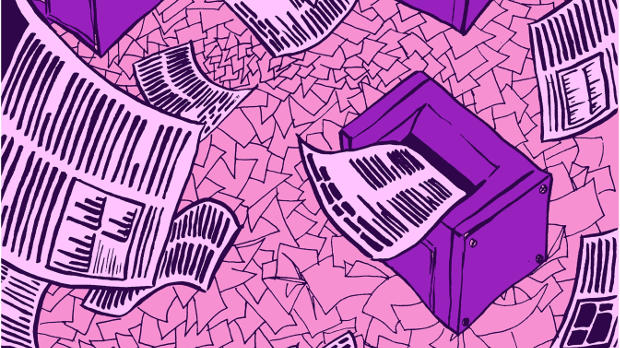 CLAUDIA STOCKER, VIVIDBIOLOGY.COM/ELIFE, S. SEIBERT ET AL. As journals multiply and the sheer volume of published scientific papers increases exponentially, biomedical scientists become less able to stay on top of the quality work being done in their fields, according to a new study. Reporting their findings in eLife last week (September 14), researchers from the University of Glasgow in Scotland suggested that biomedical scientists in the U.S. are so overwhelmed by mountains of new studies coming out every day that the so-called overflow may be eroding science itself. “There’s a flood, there’s a deluge of published and unpublished papers,” coauthor Sabina Siebert, a business professor, told Inside Higher Ed. And that flood may drown out good science and promising researchers in a rising tide of mediocre work.
CLAUDIA STOCKER, VIVIDBIOLOGY.COM/ELIFE, S. SEIBERT ET AL. As journals multiply and the sheer volume of published scientific papers increases exponentially, biomedical scientists become less able to stay on top of the quality work being done in their fields, according to a new study. Reporting their findings in eLife last week (September 14), researchers from the University of Glasgow in Scotland suggested that biomedical scientists in the U.S. are so overwhelmed by mountains of new studies coming out every day that the so-called overflow may be eroding science itself. “There’s a flood, there’s a deluge of published and unpublished papers,” coauthor Sabina Siebert, a business professor, told Inside Higher Ed. And that flood may drown out good science and promising researchers in a rising tide of mediocre work.
Siebert and her colleagues conducted anonymous interviews with US researchers—seven from government agencies and 13 from universities—asking them to speak candidly about their experiences with the modern-day scientific literature. Responses indicated that researchers feel beset with scientific results and new journals, so much so that it compromises the robustness of their fields. “Publications and research have grown exponentially so if you go back [25 to 30] years ago when I was in training there were less journals, the literature was smaller, now there is increased number of journals, more people competing for smaller resources so it seems like there's a lot that gets published that is pretty devious or questionable,” one interviewee said.
This, Siebert suggested, may be because the scientific literature is outpacing the ...




















